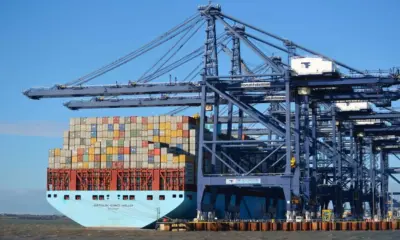Business
Post-Brexit Trade Deals Boost UK Exports to Asia-Pacific

The United Kingdom’s post-Brexit trade strategy is beginning to bear fruit as exports to Asia-Pacific nations surge to record levels. New trade agreements with countries such as Japan, Australia, and South Korea have opened up opportunities for British businesses across multiple sectors, signaling a shift in the nation’s global economic outlook. The latest data from the Department for Business and Trade shows that UK exports to the region have increased by more than 18 percent over the past year, underscoring the growing importance of the Asia-Pacific market to Britain’s post-Brexit economy.
Expanding Trade Horizons Beyond Europe
Since leaving the European Union, the UK has prioritized building new trade relationships with fast-growing economies around the world. The government’s accession to the Comprehensive and Progressive Agreement for Trans-Pacific Partnership, a major trading bloc that includes 11 nations across the Asia-Pacific, has been a cornerstone of this strategy. Membership in the CPTPP gives the UK access to markets with a combined GDP of over £12 trillion, presenting fresh opportunities for exporters in agriculture, manufacturing, and services.
The trade deals negotiated since Brexit reflect a deliberate effort to diversify economic ties and reduce dependence on European markets. Britain’s agreement with Japan, for example, has already increased exports of financial services, pharmaceuticals, and digital goods. The Australia-UK Free Trade Agreement, which came into effect in 2023, has expanded access for British food, beverages, and automobiles while lowering tariffs on Australian raw materials and agricultural products.
South Korea has emerged as another key partner, with bilateral trade surpassing £25 billion last year. Both nations have pledged to strengthen cooperation in green technology, electric vehicles, and defense industries. Negotiations are also underway with India and other emerging economies, aiming to expand Britain’s footprint in one of the world’s most dynamic economic regions.
Government ministers have hailed these successes as proof that the UK’s independent trade policy can deliver tangible benefits. Business groups have also welcomed the progress, noting that British firms are increasingly competitive in sectors aligned with Asia-Pacific demand, including education, renewable energy, and high-tech manufacturing.
Economic Benefits and Industry Impact
The surge in exports to the Asia-Pacific has been particularly strong in sectors where the UK holds established advantages. The financial services industry has expanded its presence in Singapore and Hong Kong, with British firms offering expertise in fintech, regulatory compliance, and sustainable finance. Meanwhile, the manufacturing sector has benefited from growing demand for advanced machinery, aerospace components, and pharmaceuticals.
Agricultural exports have also seen robust growth. British producers of dairy, whisky, and premium meat products have found enthusiastic markets across Asia, where consumer demand for high-quality imported goods continues to rise. The removal or reduction of tariffs under the new agreements has made UK products more competitive, boosting rural economies and supporting thousands of jobs across the supply chain.
The energy sector has emerged as a key beneficiary as well. The UK’s expertise in offshore wind and hydrogen technology has positioned it as an attractive partner for countries pursuing their own green energy transitions. Collaborative projects between British and Asian companies are underway in renewable infrastructure, carbon capture, and clean energy storage. These initiatives not only strengthen trade relations but also contribute to shared climate goals.
However, challenges remain. Some small and medium-sized enterprises still face barriers related to logistics, customs procedures, and regulatory differences. The government has launched export support programs to help smaller firms navigate these complexities, offering financial assistance, market intelligence, and training. The Department for Business and Trade has also expanded its overseas network to provide on-the-ground support for exporters entering new markets.
A Geopolitical and Strategic Shift
Beyond economic considerations, the UK’s growing engagement with Asia-Pacific nations represents a broader geopolitical realignment. London’s Indo-Pacific Tilt, outlined in the government’s 2023 foreign policy review, emphasizes strengthening economic, diplomatic, and security partnerships across the region. Joining the CPTPP and deepening ties with key allies such as Japan and Australia reflect the UK’s ambition to play a more active role in shaping the global trade order.
Political analysts note that this strategy serves dual purposes. Economically, it diversifies the UK’s trade portfolio, reducing vulnerability to fluctuations in European demand. Diplomatically, it reinforces Britain’s influence in a region that is increasingly central to global economic growth and security. The move aligns with efforts by Western allies to promote open markets and shared standards in an era of rising geopolitical competition.
Critics of the post-Brexit trade agenda have argued that the benefits may take time to fully materialize and that some sectors still face adjustment costs. However, supporters maintain that the long-term advantages outweigh the short-term challenges. They point to the UK’s ability to negotiate flexible, sector-specific agreements that support innovation, digital trade, and sustainable development.
The ongoing trade expansion also strengthens London’s reputation as a global financial center capable of facilitating complex international commerce. By leveraging its strengths in finance, legal services, and technology, the UK is well positioned to support the continued growth of Asia-Pacific trade networks.
Conclusion
The rise in UK exports to the Asia-Pacific region marks a defining success for Britain’s post-Brexit trade strategy. Through a combination of ambitious diplomacy, competitive industries, and strategic partnerships, the nation has begun to realize the potential of its new global trade identity. The challenge now is to sustain this growth by supporting smaller exporters, ensuring regulatory alignment, and maintaining momentum in trade negotiations.
As the global economy becomes increasingly centered around the Asia-Pacific, the UK’s ability to integrate itself into these markets will play a critical role in shaping its economic future. For policymakers and businesses alike, the message is clear: Britain’s path to prosperity now extends well beyond Europe, anchored by innovation, collaboration, and a renewed spirit of global engagement.






















